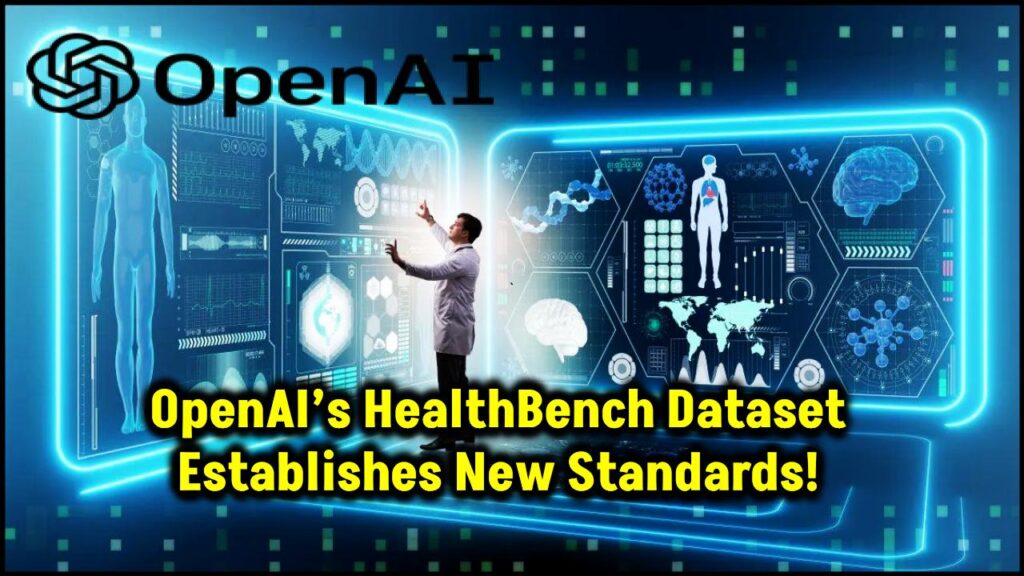OpenAI’s HealthBench Dataset Establishes: Artificial intelligence is rapidly becoming a core part of the healthcare industry, and with it comes an urgent need for safety, accuracy, and trust. OpenAI’s HealthBench Dataset is setting new benchmarks for how we evaluate these AI systems—specifically large language models (LLMs)—in medical contexts. This groundbreaking open-source resource is designed to test AI performance and safety in real-world healthcare scenarios, bringing a new level of accountability and transparency to AI in medicine.

Whether you’re a physician, medical researcher, tech enthusiast, or just someone curious about how AI is changing healthcare, HealthBench offers a powerful look into the future of medical AI—and how we can ensure it’s safe, accurate, and equitable.
OpenAI’s HealthBench Dataset Establishes
| Feature | Details |
|---|---|
| Dataset Name | HealthBench |
| Created by | OpenAI |
| Scope | 5,000 multi-turn, multilingual healthcare conversations |
| Medical Specialties | 26, including neurology, ophthalmology, emergency medicine |
| Evaluator Panel | 262 licensed physicians from 60 countries |
| Assessment Criteria | 48,000+ unique rubrics: accuracy, appropriateness, clarity |
| Top Model Score | OpenAI’s o3 Model – 60% |
| Comparison | Grok – 54%, Google Gemini 2.5 Pro – 52% |
| Open Source | Yes – data and tools freely available |
| Target Use | Medical AI development, benchmarking, and validation |
| Official Resource | OpenAI HealthBench |
OpenAI’s Health Bench is more than just a dataset—it’s a new standard in how we test and trust AI in medicine. By offering a transparent, medically grounded, and globally relevant benchmark, HealthBench is helping build safer, smarter, and more ethical AI tools for healthcare worldwide. As AI continues to revolutionize medicine, datasets like HealthBench will be critical for separating hype from helpfulness. And with its open-source model, the entire medical and tech community can collaborate to improve care for everyone.
What Is Health Bench and Why Does It Matter?
HealthBench is a massive, multilingual dataset created to evaluate AI in healthcare settings. Instead of using simplistic yes/no or multiple-choice tests, HealthBench provides 5,000 complex, back-and-forth conversations that simulate real doctor-patient interactions. This means AI systems are being tested on their ability to understand context, provide detailed answers, and behave responsibly—just like a human doctor would.
Each interaction touches on real-life medical situations across 26 specialties like neurology, internal medicine, and emergency care. This diversity ensures that AI models aren’t just smart in one area—they’re tested on a broad, practical range of healthcare knowledge.
“What makes HealthBench different is the human expertise baked into every evaluation,” says OpenAI. Every AI response is reviewed by licensed physicians using specialized criteria tailored to clinical scenarios.
OpenAI’s HealthBench Dataset Establishes: How Does HealthBench Work?
Step-by-Step Breakdown
Step 1: Multilingual Medical Dialogues
Includes patient questions and doctor responses, often in a multi-turn format (back-and-forth conversations). Covers critical real-world tasks like symptom explanation, diagnosis discussions, treatment planning, and follow-up advice.
Step 2: Physician-Crafted Rubrics
More than 48,000 detailed criteria designed by doctors. These rubrics test AI on accuracy, clarity, safety, bias mitigation, and appropriateness.
Step 3: Model Evaluation
AI models are fed the dataset and generate responses. Human physicians review the AI’s output line-by-line, scoring it based on the rubric.
Step 4: Public Benchmarking
Scores are shared openly, allowing researchers and developers to compare models fairly.
AI Model Performance: Who’s Leading the Race?
OpenAI’s o3 model currently leads the benchmark with a 60% overall score, outperforming:
- Elon Musk’s Grok – 54%
- Google’s Gemini 2.5 Pro – 52%
This shows that even today’s most advanced AI systems have plenty of room to grow—a 60% score means they still fall short 40% of the time when handling real-life medical conversations.
Interestingly, smaller models like GPT-4.1 Nano have shown surprising performance improvements. They’re faster and cheaper while still maintaining respectable accuracy, making them great candidates for resource-constrained healthcare environments.
Why This Matters for Professionals and the Public
Whether you’re a healthcare provider or a tech policy maker, HealthBench helps you make informed decisions about using AI in clinical workflows.
For Healthcare Providers
- Evaluate if AI tools align with clinical standards
- Gain insight into model limitations and possible risks
For Developers
- A gold standard to train and test new medical AI tools
- Understand how to build models that generalize across specialties and languages
For Policy Makers
- Evidence-based data for regulating AI in healthcare
- Benchmark to define compliance and ethical use cases
Practical Use Cases
| Use Case | Description |
|---|---|
| Clinical Decision Support | Evaluate AI tools that assist doctors in diagnosing or treating patients. |
| Patient Communication Bots | Test how AI handles sensitive conversations about illness or treatment. |
| Medical Education | Train students using AI models that have been validated through HealthBench. |
| Global Health Projects | Benchmark AI tools designed for use in underserved or multilingual regions. |
Challenges and Ethical Considerations
While HealthBench is a huge leap forward, it isn’t a silver bullet. Experts caution:
- Bias Risk: AI models may reflect biases in training data. If that bias isn’t identified through diverse human evaluation, it could affect patient care.
- Scoring Limitations: Even human reviewers may disagree on complex cases.
- Not a Replacement for Doctors: AI should support, not replace, professional medical judgment.
Learn More & Explore Official Resources
- Official Announcement by OpenAI
- HealthBench Technical Paper (PDF)
- GitHub Repository (Coming Soon)
Google And Nvidia Invest $300 Million In AI Startup — Check If This Could Rival OpenAI
FAQs on OpenAI’s HealthBench Dataset Establishes
Q1: Is HealthBench only for AI companies?
No. While AI developers are a key audience, clinicians, researchers, students, and policymakers can all benefit from the insights.
Q2: Can HealthBench be used to train AI models?
Technically yes, but it’s primarily designed for evaluation, not training.
Q3: Is HealthBench HIPAA-compliant?
The dataset is synthetically generated, so it doesn’t contain real patient data—making it safer to use while still mimicking real-world situations.
Q4: How often is HealthBench updated?
OpenAI has committed to regular updates as medical practices, languages, and AI capabilities evolve.
Q5: Can I contribute to HealthBench?
Yes. Researchers and clinicians can collaborate with OpenAI or build tools around the dataset using the open-source resources.





